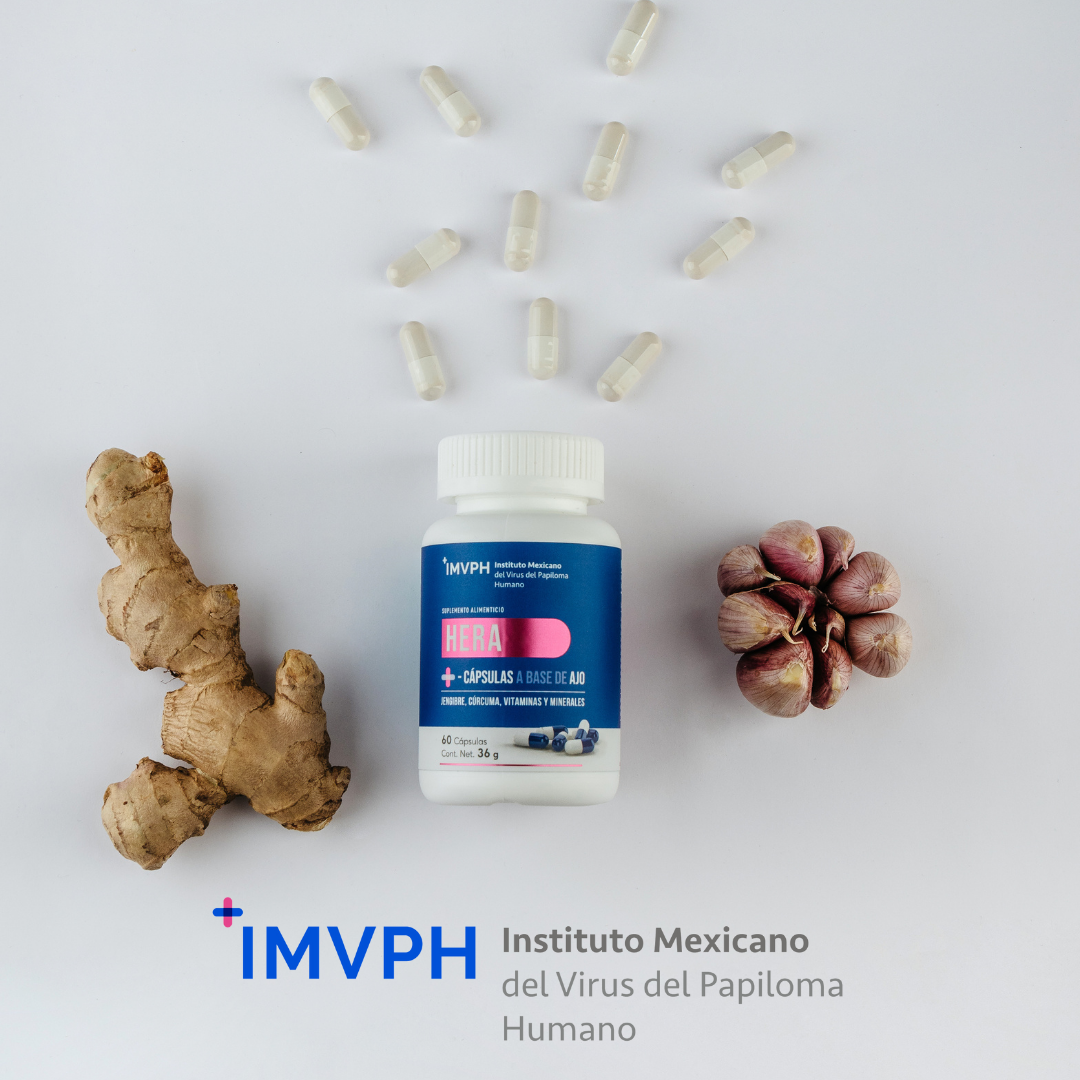
¿Por qué se seleccionaron los ingredientes de Hera?
Hera fue formulado basado en evidencia científica disponible, a continuación ofrecemos una lista de los artículos científicos en los que se basó la selección de ingredientes que contiene Hera:
Ajo
El ajo (Allium sativum) tiene una larga historia de uso medicinal. Los antiguos egipcios, griegos y chinos lo utilizaban para el tratamiento de diversas enfermedades, se ha demostrado que los componentes del ajo tienen efectos antivirales y anticancerígenos. Diversos estudios mostraron que el extracto de ajo es efectivo en la resolución completa de las verrugas cutáneas causadas por el virus del papiloma humano
Cúrcuma
La cúrcuma (Curcuma longa) tiene innumerables efectos sobre la salud y es reconocida como un agente antiviral, anticancerígeno, antiinflamatorio y cicatrizante de heridas. Además ha demostrado tener un fuerte efecto anti-VPH. A la luz de los estudios y datos disponibles, el extracto de cúrcuma funciona como antioxidante y como un fuerte agente contra el VPH, que puede usarse para prevenir la infección por VPH y facilitar el tratamiento eficaz de las manifestaciones causadas por este virus.
Jengibre
El jengibre (Zingiber officinale) tiene propiedades antioxidantes que ayudan a controlar algunas de las manifestaciones causadas por el VPH, entre ellas una de las más importantes son sus propiedades anticancerígenas en el control del cáncer cérvico uterino.
Antioxidantes
Hera cuenta con vitaminas (A, C, E, ácido fólico) y licopenos que son potentes antioxidantes con reconocidos efectos contra el VPH protegiéndote contra las manifestaciones de la enfermedad.
Minerales
El selenio y magnesio permiten al sistema inmune funcionar de manera más eficiente.
Fuentes científicas:
- Ono A, Koshiyama M, Nakagawa M, et al. The Preventive Effect of Dietary Antioxidants on Cervical Cancer Development. Medicina (Kaunas). 2020;56(11):604.
- Siegel E.M., Craft N.E., Duarte-Franco E., Villa L.L., Franco E.L., Giuliano A.R. Associations between serum carotenoids and tocopherols and type-specific HPV persistence: The Ludwig-McGill cohort study. Int. J. Cancer. 2007;120:672–680. doi: 10.1002/ijc.22346.
- Huang X., Chen C., Zhu F., Zhang Y., Feng Q., Li J., Yu Q., Zhong Y., Luo S., Gao J. Association between dietary vitamin A and HPV infection in American women: Data from NHANES 2003–2016. BioMed Res. Int. 2020;2020:4317610. doi: 10.1155/2020/4317610.
- Marullo R., Werner H., Zhang H., Chen G.Z., Shin D.M., Doetsch P.W. HPV 16 E6 and E7 proteins induce a chronic oxidative stress response via NOX2 that causes genomic instability and increased susceptibility to DNA damage in head and neck cancer cells. Carcinogenesis. 2014;36:1397–1406. doi: 10.1093/carcin/bgv126.
- Guo L., Zhu H., Lin C., Che J., Tian X., Han S., Zhao H., Zhu Y., Mao D. Associations between, antioxidant vitamins and the risk of invasive cervical cancer Chinese women: A case-control study. Sci. Rep. 2015;5:1–10. doi: 10.1038/srep13607.
- Vahedpoor Z., Mahmoodi S., Samimi M., Gilasi H.R., Bahmani F., Soltani A., Esfahani M.S., Asemi Z. Long-term vitamin D supplementation and the effects on recurrence and metabolic status of cervical intraepithelial neoplasia grade 2 or 3: A randomized, double-blind, placebo-controlled trial. Ann. Nutr. Metab. 2018;72:151–160. doi: 10.1159/000487270.
- Deuster E., Jeschke U., Ye Y., Mahner S., Czogalla B. Vitamin D and VDR in gynecological cancers—A systematic review. Int. J. Mol. Sci. 2017;18:2328. doi: 10.3390/ijms18112328
- Giuliano A.R., Siegel E.M., Roe D.J., Ferreira S., Baggio M.L., Galan L., Duarte-Franco E., Villa L.L., Rohan T.E., Marshall J.R., et al. Dietary intake and risk of persistent human papillomavirus (HPV) infection: The Ludwig-McGill HPV Natural History Study. J. Infect. Dis. 2003;188:1508–1516. doi: 10.1086/379197.
- Piyathilake C.J., Henao O.L., Macaluso M., Cornwell P.E., Meleth S., Heimburger D.C., Partridge E.E. Folate is associated with the natural history of high-risk human papillomaviruses. Cancer Res. 2004;64:8788–8793. doi: 10.1158/0008-5472.CAN-04-2402.
- Manju V., Kalaivani Sailaja J., Nalmi N. Circulating lipid peroxidation and antioxidant status in cervical cancer patients: A case-control study. Clin. Biochem. 2002;35:621–625. doi: 10.1016/S0009-9120(02)00376-4.
- Chih H.J., Lee A.H., Colville L., Binns C.W., Xu D. A review of dietary prevention of human papillomavirus-related infection of the cervix and cervical intraepithelial neoplasia. Nutr. Cancer. 2013;65:317–328.
- University of Basel. "Magnesium is essential for the immune system, including in the fight against cancer." ScienceDaily. ScienceDaily, 19 January 2022.
- Aggarwal BB, Kumar A, Bharti AC. Anticancer potential of curcumin: preclinical and clinical studies. Anticancer Res. 23, 363–398 (2003)
- Zivarpour P, Nikkhah E, Maleki Dana P, Asemi Z, Hallajzadeh J. Molecular and biological functions of gingerol as a natural effective therapeutic drug for cervical cancer. J Ovarian Res. 2021;14(1):43. Published 2021 Mar 11. doi:10.1186/s13048-021-00789-x

Dejar un comentario